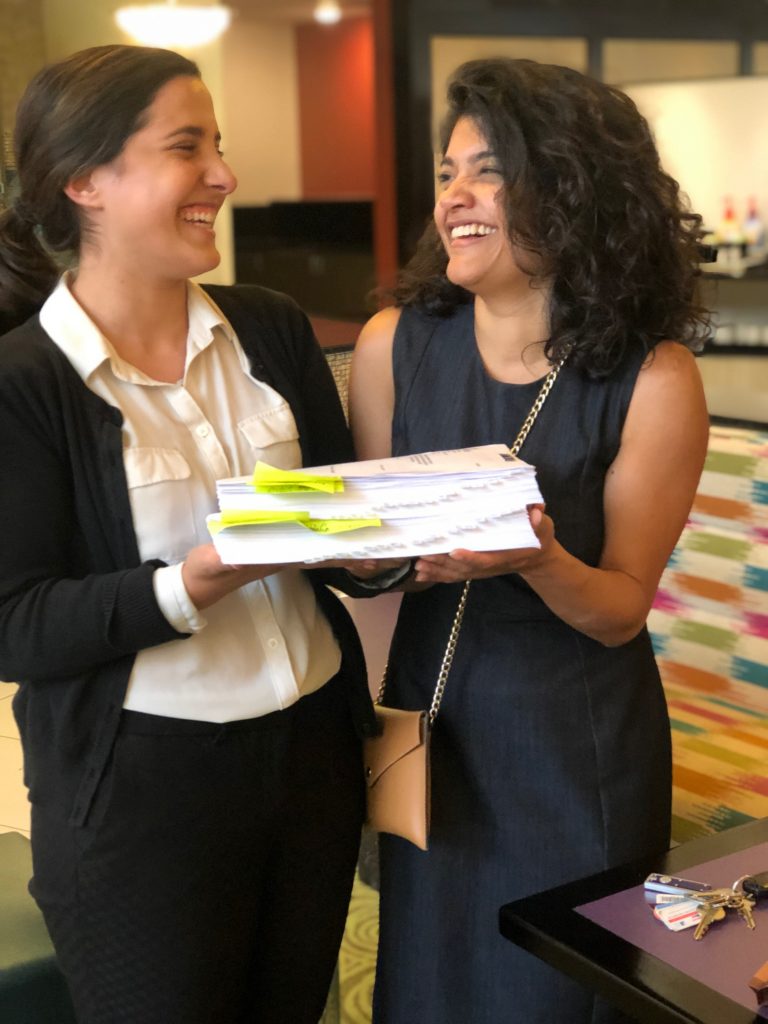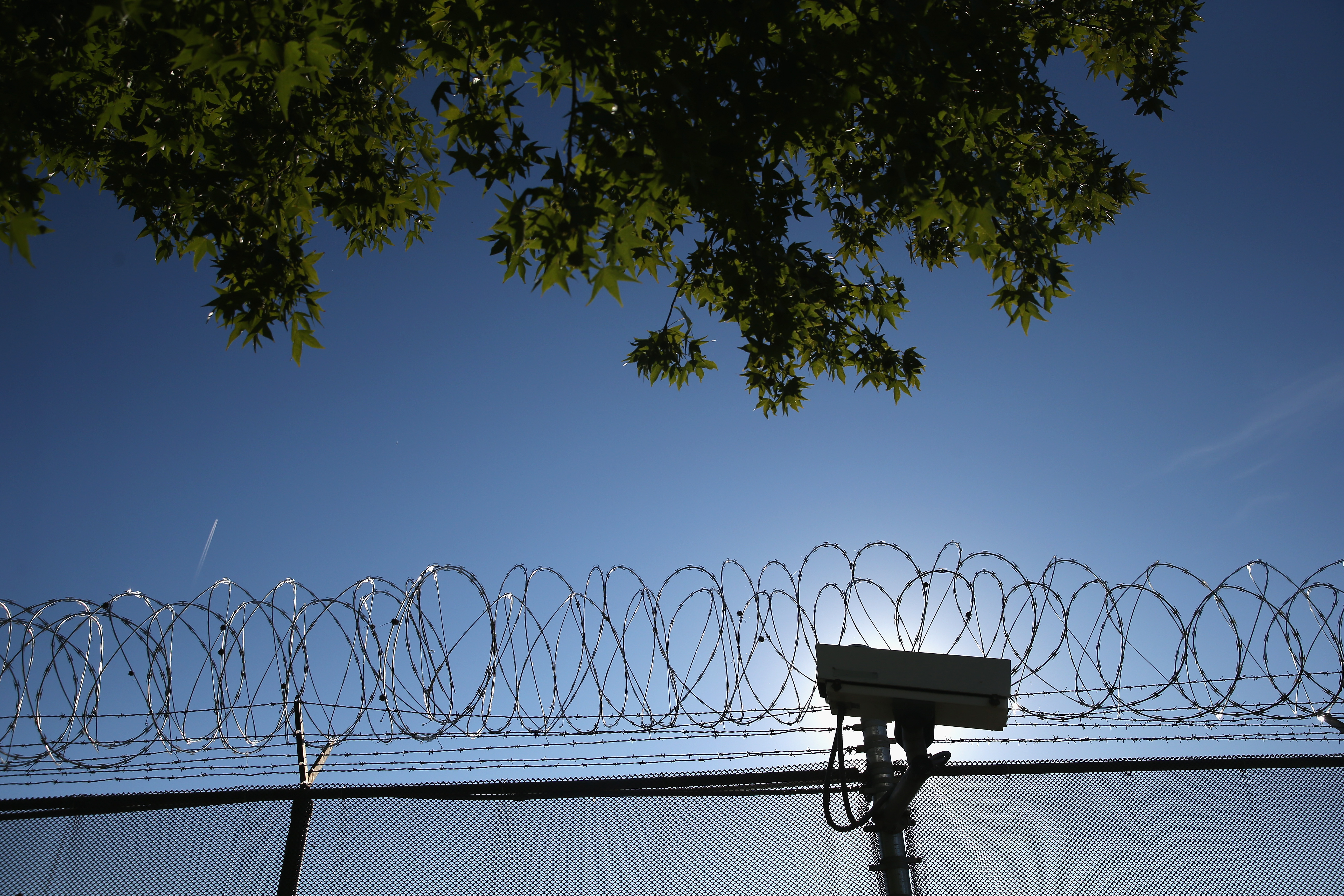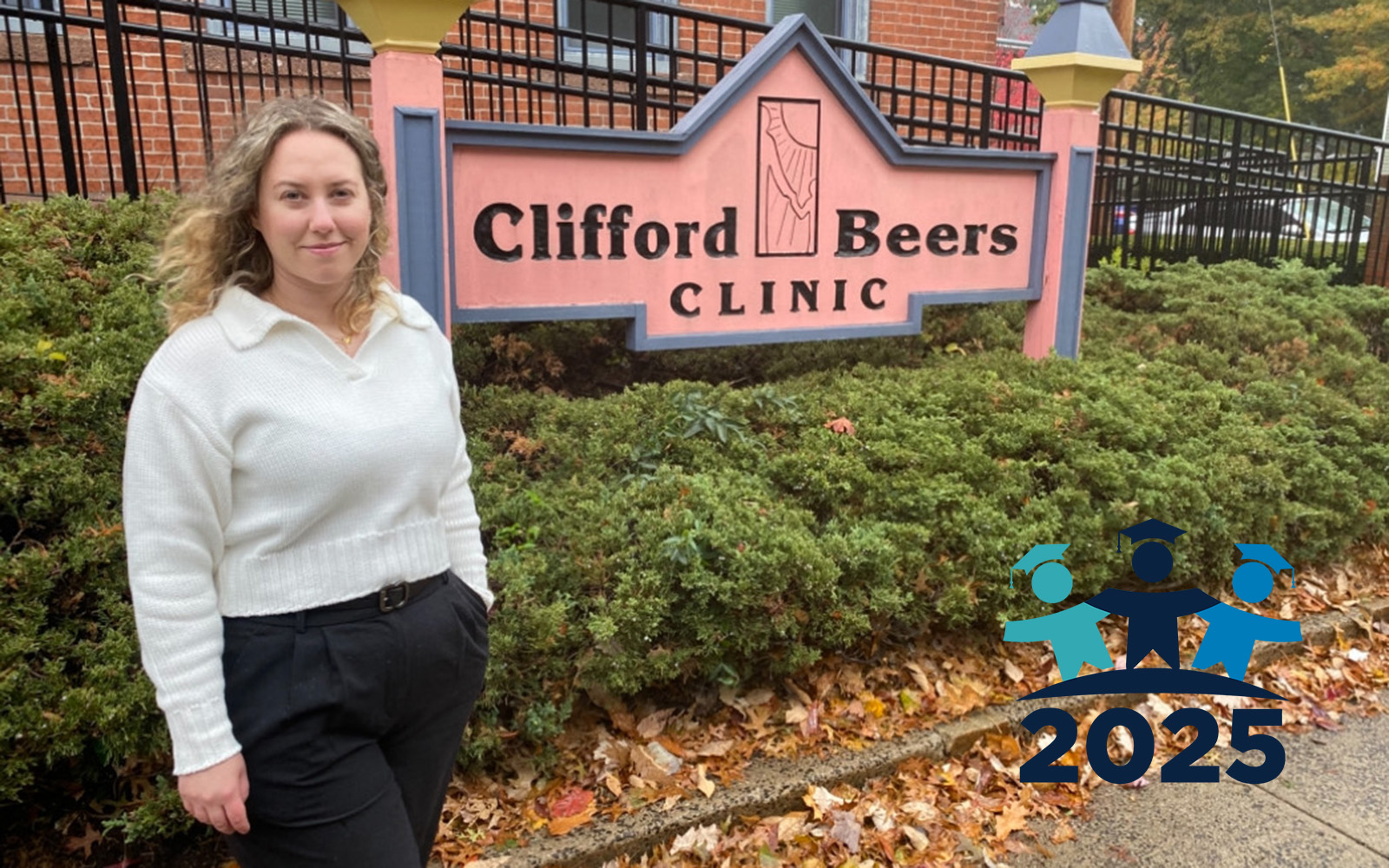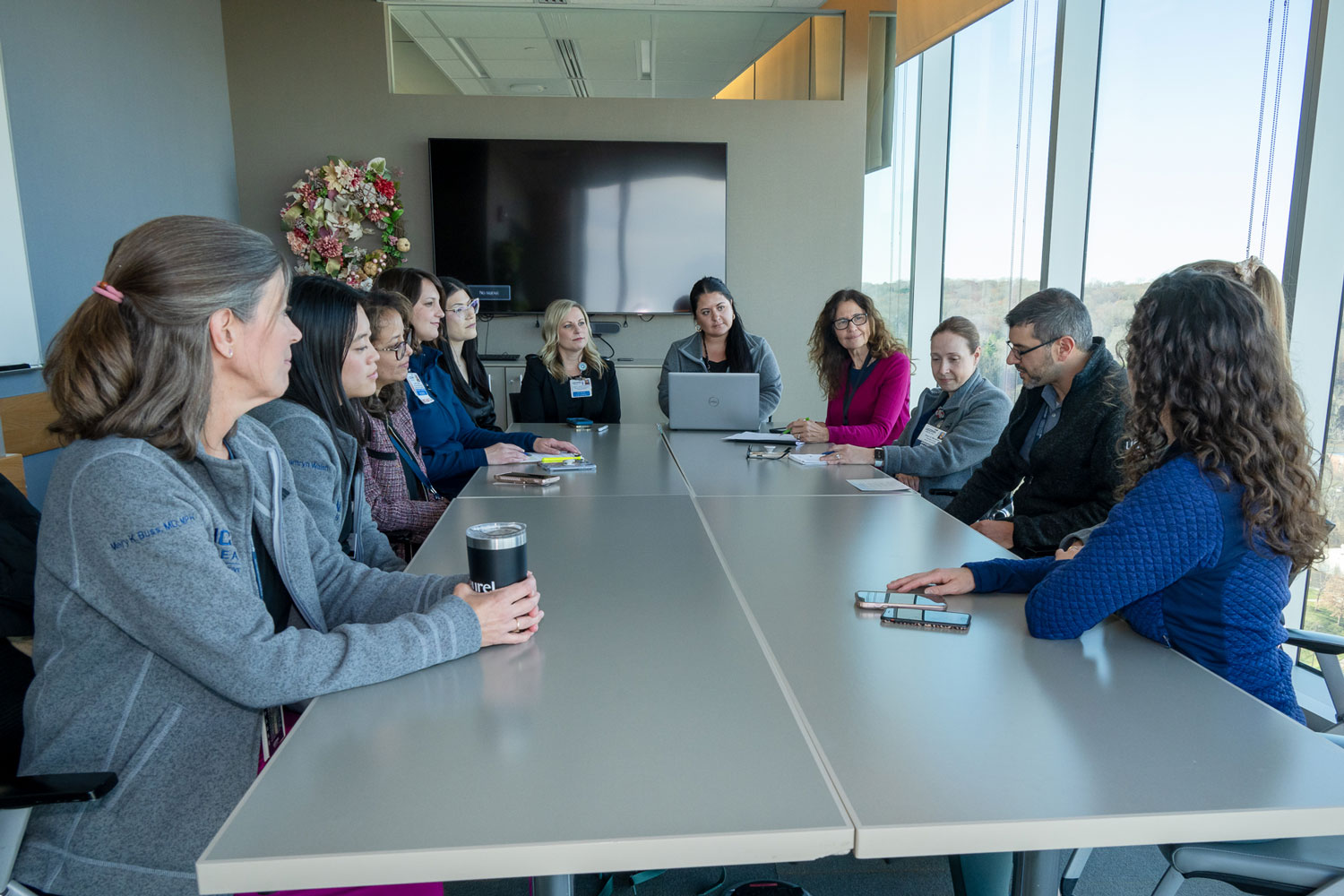Fear of gangs and drug cartels. Of their home governments. Of their own family members.
Fear of persecution. Of the police. Of being killed.
Fear of deportation, or that someone they care about will be deported.
Fear that no matter where they went in their home country, they would find no safe haven.
Demonstrating a “credible fear” of returning home is the first hurdle that an individual must overcome when seeking asylum in the United States, and the formal demonstration of that credible fear comes in the form of an interview before a federal asylum officer that requires explicit discussion of the traumatic experiences that led them to flee.
Preparing detainees for this all-important credible fear interview was only part of the work undertaken by the faculty, students and alumni who participated in this year’s Immigration Detention Service Project – a partnership between UConn’s School of Law Asylum and Human Rights Clinic and UConn’s School of Social Work that brings teams of attorneys and law students, interpreters, and experts on social work, mental health and trauma inside immigration detention centers for one week a year to assist detainees by preparing and arguing their claims for asylum before federal immigration authorities, and conducting psychological evaluations for use in those legal proceedings.
Twenty-two UConn-affiliated volunteer participants – including five legal teams, each comprised of two law students and a supervising attorney; a clinical social work team; a research social work team; and three undergraduate and alumni interpreters – embarked on this year’s trip, which took place from June 2 to June 7 and was conducted in partnership with ALDEA, a nonprofit legal and service organization that assists immigrant communities. The participants in this year’s trip were UConn School of Law students Emma Hale, Danielle Schmalz, Alexandra Santos, Zachary Bellis, Hannah Kang, Shelby Downes, Jenny Labbadia, Tennyson Benedict, Kyle Smith, and Kimberly Wilson; Patricia Jimenez ’21 (CLAS), who served as an interpreter; School of Law faculty members Jon Bauer and Valeria Gomez; Nina Rovinelli Heller, Dean of the School of Social Work; School of Social Work faculty members S. Megan Berthold, Kathryn Libal, and Scott Harding; School of Law alumni and practicing attorneys Meghann LaFountain, Jennifer O’Neill, and Ben Haldeman; Nicole Sanclemente, a Class of 2019 graduate who served as interpreter; and Chester Fernandez, a public defender in New Britain who served as an interpreter and attorney.
Unlike previous years where the trip has focused solely on assisting individual adult detainees being held at the York County Prison in York, Pennsylvania, this year UConn teams also worked with families being held in detention at the Berks County Family Residential Center in Leesport, Pennsylvania.
Law and Social Work: A Unique Model
While other colleges and universities have sponsored similar programs where faculty and law students assist detainees in immigration proceedings, UConn’s program is unique in that it also integrates social workers with mental health and trauma expertise in its work.
“The School of Social Work shares with the Law School dual missions of preparing students for professional practice and adding to our respective knowledge bases,” said Nina Rovinelli Heller, the dean of the School of Social Work and a clinical social worker who participated in the trip for the first time this year. “As our two schools have worked together on this detention project, we are increasingly aware of points of convergence in social justice practice. The combination of law and social work can yield important initiatives on behalf of many oppressed and disadvantaged groups.”
Jon Bauer is a clinical professor of law and director of the UConn School of Law’s Asylum and Human Rights Clinic. A lead co-organizer of the annual trip, Bauer said that the experience of having mental health professionals working side-by side with legal teams is tremendously valuable from both a client-service perspective but also for the well-being of the detainees themselves.
“There was a spillover therapeutic value for the clients, although it was not therapy,” he said. “And, even in cases where no psychological evaluation was conducted, it was a great resource for the lawyers and law students to be able to sound out issues with the social workers about how to approach some difficult issues. It was very valuable to get input on what to do, for example, with a client who seemed depressed and inclined to give up, even though they might have a strong claim for relief.”
In addition to conducting mental health evaluations and supporting the practice work of the legal teams, UConn’s social work contingent also conducted trainings prior to the trip to help prepare the volunteer participants for the personal and emotional toll that the experiences might have on them, and later made themselves available to some of the legal team members and volunteer interpreters who found themselves struggling with the weight of the stories they encountered while assisting clients in detention.
“The support in terms of helping people in the legal group to process their emotions and their stress – having the social work contingent was tremendously valuable,” said Bauer.
The social work clinicians also made themselves available as expert witnesses supporting the detained clients, offering to provide testimony by telephone if necessary at proceedings that were scheduled to continue well after the week-long trip had concluded.
“What an incredible opportunity to use your professional training and your specialized skill set for good in this realm, and for people who rarely have the opportunity to have a legal representative or legal team member or to meet with a mental health professional to have the opportunity to do so,” said S. Megan Berthold, an associate professor in UConn’s School of Social Work who was one of the original co-organizers of the inaugural Immigration Detention Service Project trip and has participated in the project every year. “For some, it’d be the very first time in their life that they’ve ever met with a lawyer, a law student, or a mental health professional.”
The Challenges of Working with Detained Children
One of just three family detention facilities in the country, and with the capacity to hold 96 detainees, about 25 refugees seeking asylum were at Berks while the UConn teams worked in the facility, which has been the subject of some controversy, with local advocacy groups and former detainees calling for its closure.
Unlike the highly publicized masses of refugees at the U.S.’s southern border, most of the Berks residents entered the country through the northern border, with asylum seekers from countries including Mexico, Guatemala, Honduras, Venezuela, India, and Romania first traveling to Canada before crossing the border and seeking asylum protections in the United States.
“Berks has the veneer of being a kid-friendly place, but it has a strange, Twilight-Zone sort of vibe to it,” said Bauer. “It’s like it’s trying very hard to be kid-friendly, but it’s in essence a detention center.”
Bauer said that the teams encountered difficulties at Berks right away, when facility administrators suddenly changed rules about how many people could be physically in the room with a detainee at any time, which meant that, if an interpreter was needed to communicate with the family, a member of the legal team would have to sit out the meeting due to this unexpected limitation.
“It’s really hard to be both the lawyer and the interpreter,” said Berthold, “so the interpreters really were pivotal. It takes specialized skills and personal abilities to be able to interpret in these sorts of cases.”

The staff at Berks also would not tell the legal teams when hearings were scheduled to occur, instead saying that information had to come from the asylum office in New Jersey, which led to the legal staff missing a few hearings and then attending others on the fly when meetings meant to prepare detainees for credible fear interviews suddenly turned into actual hearings before federal asylum officers.
In total, one of the UConn teams at Berks prepared seven families for their credible fear interviews while working at the facility, and then actually represented three of the families before an asylum officer at their credible fear interview proceedings.
A second UConn team worked intensively with a family that was already under a deportation order and prepared a motion to reopen their removal proceedings. That motion resulted in an initial stay of the deportation order; the motion was later granted, and the family was released from detention pending additional proceedings as they pursue their claim for asylum.
The detained parents being held at Berks at the time ranged in age from 20 to 40; the youngest child the UConn teams saw in detention was two years old, while the oldest was 16.
“During the credible fear interviews the legal team was sitting in a room with the family, and we were allowed to intervene occasionally and to make a closing argument,” said Bauer. “But usually the kids were there at the credible fear interviews, which was difficult because the kids have to listen to a parent talking about their persecution. The kids could be excused, but there’s kind of a presumption that, unless special steps were taken to excuse the kids, they were going to be there.”
As a mental health professional, Berthold has worked extensively with refugees, immigrants, survivors of torture and asylum seekers, but working with children in detention presented particular challenges, especially when children could be forced to either listen to their parents testify about their credible fears of returning to their home country or to actually testify themselves.
“It can be very damaging to the child, who looks to their parent for safety and security, and for protection – emotional, physical protection – to be confronted with some of this reality,” said Berthold. “Wow, my parent has these big limitations and there really is a danger. Our lives were in danger. Because that’s what you have to prove in a credible fear interview. You fear that your life would be in danger if you were to go back, and that can be just terrifying, especially when the future is so unknown.”
One teenager, Bauer said, was so terrified of disclosing any information about his own experiences that he asked his father not to talk about it either; he feared that the people who had threatened him in his home country would take revenge if the family was sent back. Children will often feel a sense of responsibility, Berthold said, if they are forced to testify and the outcome is then unfavorable for the family.
“A child may not understand all the proceedings and may feel very conflicted and uncertain,” Berthold said. “Are they going to cause a big problem? Are they going to be the reason their family gets sent back? Of course, it depends on the age and the developmental level of the child, and what they can understand, but it puts children in really bad situations.”
Six of the eight families the UConn teams worked with at Berks are now out of detention while the full proceedings of their pending asylum cases proceed.
“They’re not done yet, but they’re out of detention, which must be a huge relief, but they also are now able to have their cases actually examined on the merits and to maybe have that chance to get asylum and safety here,” said Berthold. “So, I find that to be, I think for the group, just enormously meaningful, knowing that our teams really contributed to that – the legal teams, the social work teams – but also, more importantly, knowing how meaningful that is for the people themselves, what a change in their life circumstances that provides them.”
“Seven Angels” at York
“We had one client in particular who was very grateful for the work that we were doing and very poetically expressive of his gratitude,” said Valeria Gomez, the William R. Davis Clinical Teaching Fellow in UConn’s Asylum and Human Rights Clinic who led one of the UConn legal teams that worked primarily at York County Prison this year.
“He had a hearing coming up within the next week, so we were very time constrained for him,” Gomez said of the poetic detainee. “He said, ‘I was praying for God to send me one person, just one person to sort of kind of guide me, tell me what I had to say, because I had no idea, and then he sent me seven angels.’”
The client was granted asylum the very next week.
Surrounded by fences topped with razor wire, York looks from the outside like a typical state or county prison and can hold more than 2,000 offenders. But it also houses federal immigration detainees in the custody of U.S. Immigration and Customs Enforcement.
“Many of us found our clients to be very resilient and inspiring, even in the context of enormously challenging life circumstances,” said Heller. “They truly gave a ‘face’ to the human realities of seeking asylum.”
While teams at Berks focused mainly on the credible fear interview process, many of their clients at York were awaiting full asylum hearings while still in detention. Gomez and the legal teams worked closely with School of Social Work Associate Professors Kathryn Libal, director of UConn’s Human Rights Institute, and Scott Harding, who focused on conducting research and preparing reports on conditions in the detainees’ home countries that would support their asylum claims.
“What we were doing was trying to prepare the person who was detained for what that hearing might look like, while also trying to develop a declaration and trying to put together evidence packets,” said Gomez. “[The social work team] did a fantastic job of accumulating country conditions research that essentially gave credence to the basis of their stories.”
While many of the detainees they worked with had asked to meet with counselors or therapists, officials at York had not followed up with these requests. Berthold and Heller conducted mental health evaluations that could be used to support the detainees’ claims in their asylum proceedings but also provided an outlet for refugees to talk about their experiences in ways they had not previously been afforded.
“The two clients we worked with both told us both that they really appreciated the opportunity to tell their story, because it felt like they were relieving some of the pressure that they had to keep inside by just trying to keep the story and not having anyone to share it with,” Gomez said. “As legal professionals, and as law students, we were concerned because we’re providing legal services – we’re not trained to offer therapy or mental health counseling – but it was just a reflection of how much of need for that there is in this system.”
While the York teams didn’t experience the same administrative difficulties as the Berks teams – in fact, Gomez said, the correction officers at York were generally pleasant and interested in the work the volunteers were doing – the teams struggled with the limited amount of time they had to meet with clients to prepare the necessary documents to make their legal claims.
Gomez said that the law student volunteers who had worked through the Asylum and Human Rights Clinic – where they take a pro bono case and work deliberately with one client on their immigration claim throughout the semester – were able to contrast that experience with the rapid-fire, on-the-spot, and limited resource experience of working in a detention facility.
“The term that we kept throwing around was ‘crisis lawyering,’” said Gomez. “One student found it very gratifying and a capstone to the clinic experience, because what she got to learn through the slow deliberate process she got to apply in a very different environment, which is probably more akin to working in under-resourced, over-worked, nonprofit-organization-type of public interest work.”
When asked what their advice would be to anyone considering participating in a future Immigration Detention Service Project trip, Bauer, Berthold and Gomez all responded with a very emphatic, “Do it!”
“‘Do it’ sounds like sort of a joke answer, but it really isn’t,” said Gomez. “We’re unique in that we bring the social work contingent and we bring undergrad interpreters who we train. So, our system is pretty great…but, the collaboration that we have with social workers just elevates the quality of work that we can do.”
“There’s really keen dedication and expertise that’s been built through partnership with the law school’s Asylum and Human Rights Clinic,” Berthold said. “We’ve been building capacity as a project, but there’s just such an enormous need that we want to continue to build capacity.”
UConn’s Immigration Detention Service Project is supported by funding from the UConn Foundation; the Schools of Social Work and Law; and UConn’s Human Rights Institute.



